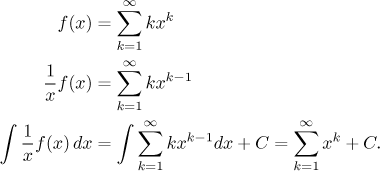
Problem: Sum up the following power series:

Solution:
We need to convert the given series into a series that we already
know. Since there are no
factorials in this series and we cannot create them there, the series for
the exponential, sine and cosine are out of question. Thus we should turn
our attention to the geometric series (or logarithmic or binomial series, if we
happen to remember them). None of these series has k in the
numerator, so we definitely need to get rid of it. We know how to do
such a thing: When we integrate a series, we divide terms by
It seems that we have a plan how to change our series so that it only features xk, that is, a geometric series that we know how to sum up. We denote the sum of the given series by f and proceed with our plan.

We almost have a geometric series, the only problem is the beginning of the indexing, but we have tricks for that, too. We can use the general add-subtract trick to fill in the missing term, however, for a geometric series we prefer to factor out the lowest term present in the series. Note that the calculations worked only for non-zero x.

Now we solve this equation for

We did our calculations for x different from 0, but at the end we obtained two functions that are equal on an interval except a point in its middle; since these two functions are continuous, we also get equality at that one point.